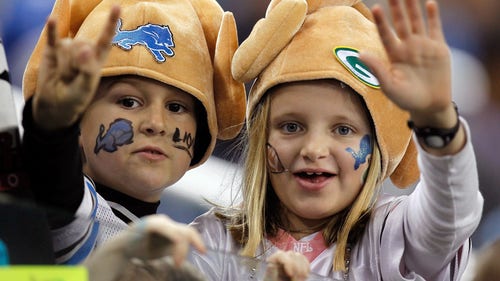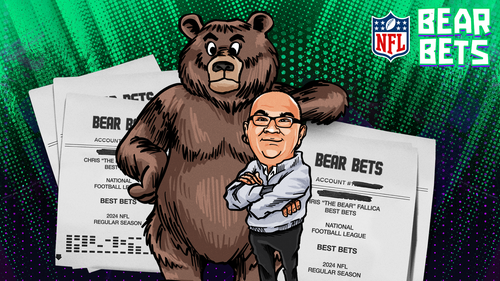
Front Office Insider: Why elite WRs will likely continue to wait for contract extensions

A true No. 1 wide receiver dramatically impacts the way opponents defend offenses.
Those who can take the top off a defense, high-point a football and outrace defenders to the end zone are at a premium in today's NFL. In short, there is a significant difference between a polished pass catcher and a bona fide playmaker.
But the market for elite wide receivers has become muddled in recent years. Though demand for Grade A players on the outside is as high as ever, every club must decide how it wants to split up its salary cap pie.
Meanwhile, four blue-chip wide receivers are in standby mode in regard to future contract extensions.
The Cowboys' Dez Bryant and Broncos' Demaryius Thomas each had the franchise tag placed on him this offseason, and neither player has yet signed the one-year tender that binds him to his team. Thomas, of course, didn't attend the Broncos' mandatory minicamp this week.
"Teams are likely going to make them play on the tag," one player agent told FOXSports.com. "It's possible that these players get tagged again."
Atlanta Falcons wide receiver Julio Jones and Cincinnati Bengals wide receiver A.J. Green had their fifth-year options picked up. Teams began to apply the option in 2013, paying players selected in the first 10 picks the average salary of the 10 highest-paid players at their position.
"The market for receivers is tough to figure out," one exec told FOXSports.com. "When Calvin Johnson and Larry Fitzgerald came off of big rookie deals in an old rookie system, the numbers became inflated."
Fitzgerald signed one of the richest deals in NFL history in 2011, an eight-year, $120 million contract with $50 million in guarantees. He was able to command such a high dollar amount because of a clause in his contract that prevented the Cardinals from trading or franchising him. Months later, the Lions gave Johnson a seven-year extension that trumped Fitzgerald's figure. Because Johnson and his camp were aware Fitzgerald had such leverage, they waited to strike on their deal.
"It's all about leverage," another prominent agent said. "These teams are looking at their alternatives with the franchise tag and what these players want. If teams couldn't tag a player, these deals would get done in a second."
The wide gap between an average annual salary of $10 million (where most top receivers are) and $15 million (Fitzgerald-Johnson territory) ultimately is where these negotiations hit a snag. Certainly, some teams -- notably the Patriots -- choose to not pay receivers big-time money.
"Part of it is it's a case-by-case scenario, but the majority of the NFL doesn't value the position the way those teams chose to do contracts," a second high-level exec said. "... When you look at Arizona and Detroit, that's not the business model teams want to follow. When deals like that get made, it causes a ripple effect. It sets the market in a place not many want to do business. Regarding Detroit, you have to think by signing Calvin Johnson to that type of deal, they had to allow one of the best defensive players [Ndamukong Suh] in football go in free agency.
Teams have a little more than a month to get a deal done before July 15, the final day they can sign a franchise player to a long-term contract. If they fail to come to an agreement, a one-year deal kicks in with no extension allowed until after the season.
Bryant and Thomas are scheduled to make $12.8 million each in 2015 if they play under the tag. Though it's an unlikely scenario, each player could hold out until Week 10 before signing the franchise tender and still accrue a season toward free agency.
"Things typically move quicker when you're negotiating with a gun to your head," a third agent said. "Teams are banking on a weak player and agent to bring the overall market down."
The question is which side will budge first.
Chargers DC encouraged by linebackers
Since John Pagano was named Chargers defensive coordinator in 2012, the club has emphasized upgrading and building depth at the linebacker position.
The Chargers used a 2012 first-round pick on outside linebacker Melvin Ingram and took Manti Te'o (2013), Jeremiah Attaochu (2014) and Denzel Perryman (2015) with second-round picks.
Perryman, who has been dealing with a hamstring injury, participated in walkthroughs this week.
"I think he hurt his hamstring running the 40 at his pro day," Pagano told FOXSports.com this week. "It was something that was torn, so we're just trying to be smart with him mentally.
"When you see him on film, he's a complete football player that just wants to tackle and hit anything in his way. He's very special. He's knowledgeable to the game. He loves football, so it's good to get him back out there. He can't wait to get the pads on, let's just say that. He's a physical football player, and you can't be physical in these OTAs right now, so he's someone who can't wait for training camp.
Perryman figures to give the Chargers' linebackers a much-needed boost, along with veteran Donald Butler, who is aiming for a bounce-back season one year after signing an extension.
"I wouldn't say it was a bad year, he just didn't make the impact plays that we were used to seeing, the interceptions, big hits and tackles," Pagano said. "He'd have a couple missed tackles in a game, and it didn't look good. I think he'll have a great year."
Pagano is encouraged by the blend of youth and experience in the linebacker room, which is led by position coach Mike Nolan, the 49ers' head coach from 2005-08. Several of the young players leaned on veterans Jarret Johnson and Dwight Freeney the past few seasons, but neither is back this year.
Pagano, who has been with San Diego since 2002, says he's encouraged by the speed and athleticism at the position and now must hope good health allows San Diego to maintain the depth it has built up over the past few drafts.
Colts' Dorsett has "more upside" than T.Y. Hilton
The Indianapolis Colts pulled off quite the draft day surprise, spending a first-round pick on wide receiver Phillip Dorsett despite having great depth at the position.
Since then, the Colts have been adamant that they like what they have in the 5-foot-10, 185-pound speedster. Dorsett combines rare speed and burst with smooth route running.
"Once Dorsett gets the offense down, I wouldn't be surprised if he eventually becomes more productive that T.Y. [Hilton]," one NFL scout said. "With his combination of speed and hands, he has more upside."
Dorsett was a big-play machine at the University of Miami last season, hauling in 36 receptions for 871 yards and 10 touchdowns. His 24.2 yards per catch ranked second in the nation.
"Phillip obviously has a lot of speed, a lot of athleticism, but I think also is a smart football player, too, in a sense," quarterback Andrew Luck told reporters this week.
Expect Dorsett to be a factor in the Colts' three-wide package and to have a role in the return game reminiscent of Hilton's during his first two years in Indianapolis.










